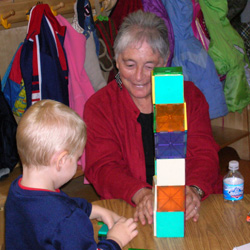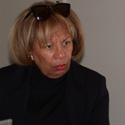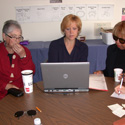The Perry Preschool Changed Their Lives
Evelyn Moore says she probably would have become a school principal. Louise Derman-Sparks believes she would have been an elementary school teacher.
Instead, they both went on to prominent careers in early childhood education after teaching at the Perry Preschool. Derman-Sparks became a professor of human development at Pacific Oaks College in California and wrote an influential book called The Anti-Bias Curriculum. Moore co-founded the National Black Child Development Institute in Washington, D.C.
"[The Perry Preschool] was powerful for me in terms of the training it provided," says Moore. "[It] catapulted me into more and more leadership roles."
"Yeah," says Derman-Sparks, smiling. "It did for us what it did for the kids."
Derman-Sparks found out about the job at Perry because she and her husband at the time babysat for founder David Weikart's children. "And he would tell us about this project that he was thinking of developing and I got very, very interested in the idea." It was the early 1960s and Derman-Sparks had just finished her master's degree in elementary education. But to get the Perry job she would need to be certified in early childhood and special education too. So she went back to school. "Then I interviewed for the job and got it."
Evelyn Moore was a special education teacher at an elementary school in Roseville, Michigan, on the other side of Detroit from Ypsilanti. She first heard about the Perry Preschool from a former college roommate who had been offered one of the teaching jobs. "Her husband was getting a Ph.D., so she said, 'I can't leave University of Illinois, but since you're in Michigan, maybe it's something you'd be interested in,'" says Moore. "So I don't remember exactly, but I must have called David Weikart, got an appointment, and the next thing I knew, I was moving to Ypsilanti."
The Perry Preschool began in the fall of 1962. It continued for five years. A total of 10 women taught at the preschool during that time. Moore and Derman-Sparks are among just a few who are still living. We brought them together for an interview in October 2008. They told us it was the first time they had ever been interviewed about their experience as teachers at the Perry Preschool.
Evelyn Moore: Dave [Weikart] wanted to try things that were not necessarily acceptable in early childhood [education] circles. We were interested in helping children develop cognitively.
Louise Derman-Sparks: This was a brand new idea. There weren't a whole lot of curricula out there, so we had to be inventive.
Moore: We had a commitment to making something happen in a way that is not necessarily in the culture of nursery school education. It's very nurturing and - "it'll all happen." And we kept [asking], "How do you make it happen?" And I think we did start off with some of the more rote kinds of learning - colors, numbers - but then we began to delve more deeply and [to think] about how do you help children build a foundation so someday they can do geometry?
Derman-Sparks: Sometimes the kids would build these block structures that would just go across the entire room. We did a lot of talking about - okay, how does playing with blocks or building a long, long, long, long, bridge - what was that developing cognitively? It was never directed teaching where we sat them around a table with paper and pencil and told them to check worksheets. We never did that kind of teaching. It was always in the framework of children actively learning.
Moore: So if they're looking at blocks or out on the playground hanging upside down you knew that you were trying to help them understand their bodies in relationship to the world in which they lived.
Derman-Sparks: The basic principle [was] allowing kids to interact with materials and with each other in a way that developed a sense of ability, of how you figure things out, of how you get the resources you need, of how you work with other people in a way that's constructive. We did a lot with things that kids could touch and feel and see. To an outsider it would have looked that a good part of the morning - because it was a morning program - was play. But it was play that was very carefully structured in terms of the materials we put in the environment and very carefully structured in terms of the interactions of the teachers with the children.
Moore: We used to make Jell-O, and we knew we weren't just making Jell-O to eat. We were changing a liquid into a solid.
Derman-Sparks: We had a science table. We made books. The environment was rich and stimulating. We really wanted them to do creative things. We wanted to extend their ideas, to develop their ideas. I think we tried to look for the individuality in each child.
Moore: We learned how to ask children questions so you did not get a yes or no answer. You know, "Tell me what you're thinking, tell me what you're doing." Open-ended questions.
Derman-Sparks: We did a lot of interaction during activity time. We stopped calling it "free play." It was activity time. The kids chose what they wanted to do, but then we watched and interacted in a way to expand what they were thinking. We used snack time to encourage conversation. I think we very deliberately wanted the kids to be a community, to learn how to talk with each other, to discuss ideas with each other, to share their thinking. I think we did do a lot of encouraging of social development. You know, how do you resolve conflicts constructively and so on. Those kids [developed] those skills.
Moore: I think as years have gone on I've begun to understand more how social-emotional development also plays a very heavy-duty role in children developing conceptual thinking. And I do think something does happen during the early years of development that gives you something inside that makes you more resilient to challenges. We somehow armored those children in ways that we may not even be able to describe.
Derman-Sparks: I think we were conscious about the music. We had music playing while activities were happening. We had rhythm bands all the time.
Moore: We would bring in Odetta and music by black artists.
Derman-Sparks: B.B. King, Ray Charles. We brought in jazz.
Moore: Pete Seeger.
Derman-Sparks: We actually had the Beatles too, because that was music the kids were listening to.
Moore: It was an atmosphere.
Derman-Sparks: We would dance with the kids. That's how I learned how to dance a lot of things I didn't know before [laughs]. We did field trips. These were kids who never left their neighborhood and we wanted them to see more of what was going on in the world around them. We wanted them to know that the world was there and they had a right to be in it. We used to take them to the library.
Moore: We took the parents too. There was an exposure for parents they had not had before.
Derman-Sparks: We built strong relationships with the families. Our message to families was: You have great kids, we're here to help you help them learn and help them succeed. We care about you, we care about your family being able to function as well as it can. We really want your kids to make it. And somehow in the two years [the children] were with us - where they were intellectually engaged and socio-emotionally supported and nurtured - they developed a sense of themselves as achievers. [That's] what I believe. And they developed dispositions of being persistent and pursuing what you're trying to learn and learning how to figure things out and how to get what you need to learn things. These were all things that we did encourage, beyond math skills or literacy skills. Somehow it helped them adapt better to life, it helped them adapt better to high school requirements. It's like when the going got harder they had the confidence, the foundation cognitive skills and socio-emotional skills, to make it.
Moore: Children who get an edge up are those who have a foundation that permits them to figure out things. And, you know, I hear it every day in the grocery stores with parents. "Well what do you think? Can you figure it out?" I mean, they don't give them the answers. And the children who have been grounded in figuring it out have a different kind of empowerment feeling about themselves. And then you get children who are 15 who have just been, "Give me the right answer." It's yes, no, learn your times tables and it's rote, rote, rote. So they've never had to figure it out.
Derman-Sparks: You have to help kids develop not only a sense that they can figure things out, but that they know how to figure things out, they have resources to figure things out.
Moore: It's critical thinking skills.
Derman-Sparks: Kids can figure things out on the street. But [can they] figure out the kind of organized learning that the dominant society expects of its children, and that more affluent families already know because they've been successful in the dominant society? They know how to teach their kids the dispositions and the intellectual skills that they need. Kids in very low-income families are not getting these skills. And on top of that [they] are experiencing racism where teachers don't believe they can [learn] this. When a child had a problem, we never attributed it to who they were racially or that they had a dysfunctional family. [We never] threw up our hands and said, "Well, what do you expect from these kids?" We saw every child as capable no matter what the challenges were. And we had kids with a lot of challenges but we never gave up on those kids and we never blamed it on families. We worked and worked and worked. And if one strategy didn't work, we figured out something else. We always felt it was our responsibility to figure out how we were going to reach this child and what we were going to do.
Moore: [When it comes to preschool today] we need to think about: What are we trying to do? And where do we want these children to go? And how do we want them to develop? You know, do we have artists in the room? Some kids will go to the art area every day, and you begin to see this kid has talent. Let's nurture it. Or, someone who's always curling up in corner with the good books, and you can help the parents understand that they ought to nurture it. Because children who are raised in affluent families, boy, if they look like they like art, they're in an art class. If they look like they want to do ballet, as clumsy as they may be, they're in a ballet class. I think we have to do that for all children and I don't think we're doing that as well as we could.
Derman-Sparks: [The Perry Preschool] gave [children] the sense that school is a place where they can learn, that you can be successful in school and go into kindergarten and be treated intelligently. We used to get kids coming back to the preschool from kindergarten, throwing up their hands in disgust because they didn't like what was happening. I remember [one child] used to come down every day because he was just so bored. I remember his complaining that when he wants to get something he can't get something, and the teacher has to tell him. You know, it was a totally teacher-directed thing and he just didn't get it. He said it was much more interesting to be in the preschool. Eventually his mother was called in; we had to tell him that he couldn't [come down to the preschool] anymore. And it broke my heart to have to tell him that.
Interviewer (Emily Hanford): What I want to know, now that you are here together - what do you want to know about the kids? What do you think about?
Moore: Well, you know, you hear the outcomes - they're not in jail, they're working. But I would like to know the context of their lives, more than just "they're not in jail." What are they doing? Did they stay in Ypsilanti? Or did they move? Are they all over the country, or all over the world? We've heard stories that some of them are in Europe.
Derman-Sparks: I'd like to know what the kids are like, what their lives are like. Because we cared very deeply about them. I'd just like to know how they are as people.
Moore: I'd like to know what happened to the parents too.
Derman-Sparks: We really believed in the kids and we loved those kids. It was a cause for us. It was a civil rights cause, so there's an element there you can't measure and you can't replicate.
Moore: I think there is something, some kind of aura, that comes with being in an experiment.
Derman-Sparks: You can replicate teachers taking the time to learn to observe kids and to think about kids and to think - what are the ideas that the kids are developing? We were allowed to develop our own work. We were not treated as technicians. We were treated as creative, thinking people. [Teachers] get really demoralized when they're treated as just mechanics to be carrying out somebody else's instructions and when they don't have time in their workday to think about their work and to talk with each other about their work. And of course that takes money.
Moore: I know that those state legislators do not want to hear this but we can't [expand preschool] on the cheap.
Derman-Sparks: My big fear is that the push to get kids ready for school is going to be done in the most simplistic, direct [way] - the rote learning - which is the cheapest way to do it. You just need technicians. You don't need people who understand children. [Teachers] are just given a book and, "today we learn one and tomorrow we learn two." So that's my fear. That in the push to do what is an important thing to do, which is to prepare kids so that they can really handle and succeed in school, we're going to end up doing it in a way that's [not going to help children in the long run].
Moore: I think [at Perry] we began the building and it's up to [a new generation of educators] to keep it moving forward.
Back to Early Lessons.









